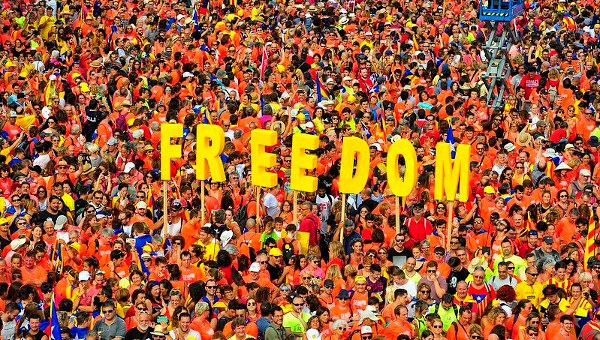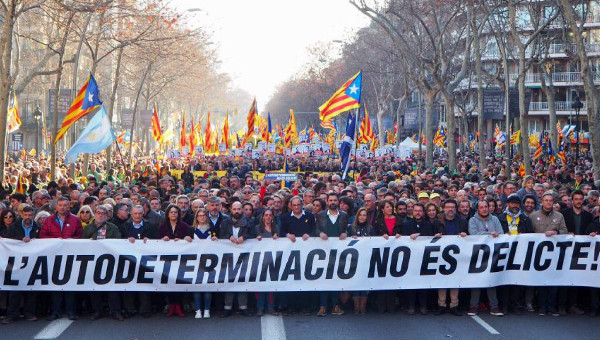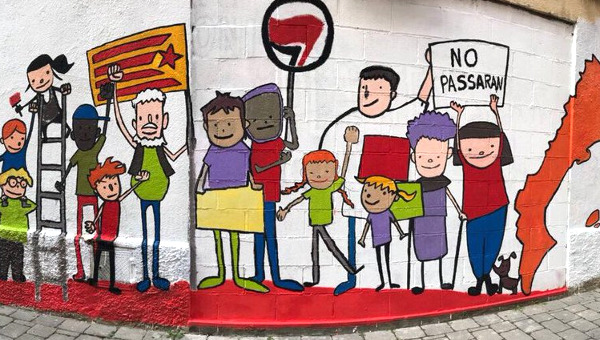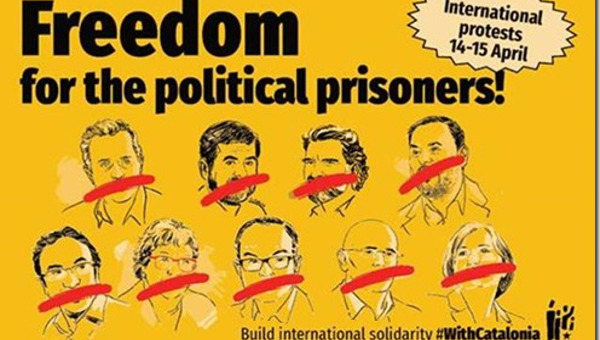Spanish PM Rajoy reacts to declaration of independence by launching assault on Catalonia’s government, parliament and other institutions.
The Spanish government’s war on Catalan autonomy and democracy is now in full offensive mode, following the Catalan parliament’s October 27 decision to proclaim their nation’s independence of the Spanish state.
In the following article, Dick Nichols, Barcelona correspondent of Green Left Weekly, reports on the sequence of events in recent days and since October 1, when a majority of Catalans – resisting massive repression by Spanish police – voted or tried to vote for independence.
I follow these reports with a brief summary of key provisions of the Catalan Declaration of Independence, which is at this point available in an authorized version only in the Catalan language. [A Scottish blogger has already made a provisional translation, available here.] It will be noted that there are two parts to the resolution of the Catalan parliament, the first explaining why Catalonia has opted to form a sovereign republic and its immediate implementation, and the second outlining plans for a “constituent process” through which a Constituent Assembly will discuss and adopt a constitution for the new republic that will then be submitted for approval in a popular democratic vote.
Whether or how these plans can be carried out will of course depend on how successfully the pro-independence forces can mobilize in the coming weeks and months in sufficient numbers to frustrate Spain’s moves to suppress their democratic aspirations.
It is more important than ever, therefore, for international supporters of Catalan self-determination to organize and mobilize in defense of that nation’s democratic rights. In the Canadian state – where Prime Minister Trudeau has constantly repeated his support for a “united Spain” and opposition to Catalan independence – Quebec activists have initiated the formation of a committee of solidarity with Catalonia. Québec solidaire, the left pro-independence party, is participating and is also circulating a petition calling on Trudeau to support Catalan self-determination, denounce Madrid’s repression, and recognize the validity of the October 1 referendum result.
Catalonia: Independence Declared after Rajoy Refuses Last-Minute Deal
Dick Nichols
Just after 3pm on October 27, the Catalan parliament voted to ratify the results of the country’s October 1 referendum on self-determination, proclaiming Catalonia “an independent state in the form of a republic.”
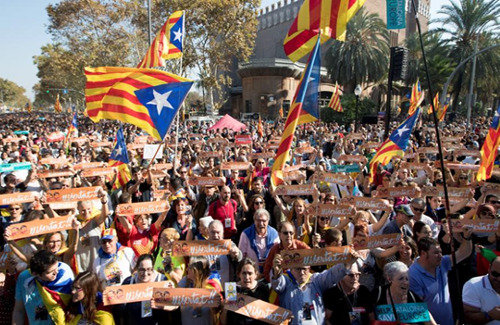 In the 135-seat Catalan parliament the vote was 70 in favour – the MPs of the pro-independence coalition Together for the Yes (JxSi) and the anti-capitalist People’s Unity List (CUP) – 10 against – the MPs of the left coalition Catalonia Yes We Can (CSQEP) – and two informal votes.
In the 135-seat Catalan parliament the vote was 70 in favour – the MPs of the pro-independence coalition Together for the Yes (JxSi) and the anti-capitalist People’s Unity List (CUP) – 10 against – the MPs of the left coalition Catalonia Yes We Can (CSQEP) – and two informal votes.
The other 53 MPs from the unionist parties Citizens, the People’s Party (PP) and the Party of Socialists of Catalonia (PSC), walked out of the chamber in protest at a vote they said violated the Spanish constitution.
Outside parliament the vote was greeted with cheers from the tens of thousands of people who had gathered for this historic moment.
The vote marked the end of a tortuous two-year ‘process’, which began after the pro-independence parties won a majority of seats (but not votes) at the September 27, 2015 “plebiscitary poll.”
Almost immediately, Spanish Prime Minister Mariano Rajoy, whose government is about to launch a takeover of Catalan government and institutions under section 155 of the Spanish constitution, tweeted: “I ask all Spaniards for calm: the rule of law will soon restore legality in Catalonia.”
The Spanish Senate voted 214 to 47 (with one informal vote) to give the Rajoy government all the powers it needs to sack the Catalan government of Carles Puigdemont, control the Catalan parliament and launch an assault on Catalonia’s institutions.
The Berserk Road to Independence
October 27 was therefore a historic day. But the most amazing, convulsive, day in modern Catalan political history took place the day before. In the space of eight hours on October 26, Puigdemont shifted his stance in the face of the looming takeover by the central Spanish government from supporting a declaration of Catalan independence to supporting early elections and dropping independence and, finally, to dropping early elections and having the Catalan parliament decide on independence.
Puigdemont’s disorienting shifts came after three days of negotiation and debate within the mass organizations and parties of the Catalan independence movement had finally produced a decision in favour of declaring Catalonia independent.
The establishment Barcelona daily La Vanguardia certainly thought so: on October 26 its gloomy front page headline read: “Radical milieu pushing Puigdemont toward UDI [Unilateral Declaration of Independence].”
The independence declaration had been on hold since October 10, when Puigdemont recognized the result of the October 1 referendum but suspended its application to call for negotiations with the PP government. When Rajoy ignored this call and pressed ahead with his war on Catalan self-rule, Puigdemont said the Catalan parliament would consider lifting the suspension. After the PP government’s draconian plans for intervention were detailed on October 21, the declaration of independence seemed a certainty.
The Establishments Mobilize
However, that conclusion underestimated the huge pressure that the Catalan, Spanish and European political and economic establishments would bring to bear on the Catalan government. The 72 hours between October 23 and October 26 saw a near-panic mobilization of these powers-that-be.
Nonetheless, their offensive failed for two reasons: the resistance of the Catalan independence movement and the refusal of the PP to drop what it sees as a precious chance to liquidate Catalan self-rule as part of its long-held recentralization agenda for the Spanish state.
The mounting pressure on the Catalan administration, which included an ongoing campaign to scare companies to register themselves outside Catalonia and stern statements from European Union spokespeople, severely shook up the Puigdemont ministry and the ruling JxSi parliamentary fraction.
At the same time, it had no impact on the CUP that had been insisting that the overwhelming Yes vote be ratified by the proclamation of the Catalan Republic.
The Conflict Unfolds
Here is how the week unfolded:
October 23, 6pm. There is no indication of the drama to come, as both the government and JxSi parliamentarians agree that the Catalan Republic should be declared on October 27.
October 24, 10am. As the details of the extent of the article 155 intervention start to sink in, discussion opens up in the Catalan cabinet as to whether it is even possible to defend the country’s institutions and whether going to early elections might not be wiser. This discussion spreads to the JxSi parliamentary group.
October 25, 4pm. The JxSi parliamentarians adopt by a large majority the position of “declaring the Republic and resisting with the people” and speakers’ notes are prepared outlining the arguments for use at 100 meetings called by the Catalan National Assembly (ANC) and Catalan culture and language association Omnium Cultural.
However, during the meeting, voices are raised against this “suicidal” course, provoking an all-in debate, the content of which is communicated to Puigdemont.
October 25, 5pm. The position of a minority of JxSi MPs – to shift to an election scenario to preserve Catalonia’s institutions (a position also held by Catalonia Yes We Can) – gets further repeated in the editorials of all the major Catalan dailies, as well as in statements by the economic establishment.
Business minister Santi Vila, who has been publicly reluctant about an independence declaration, puts out feelers to contacts in the Spanish government about the possibility of a negotiated settlement.
October 25, 7pm. At a summit of the independence movement – the government, mass organizations, parties and municipal bodies – the majority view remains that of declaring independence and “resisting with the people.”
However, Puigdemont notes a strong minority current arguing for early elections as a way of stopping an article 155 onslaught. He, too, is concerned about the capacity of the movement to resist, especially if it is divided.
The Catalan crisis is particularly worrying for Basque Premier Inigo Urkullu (Basque Nationalist Party), who fears that a successful attack on Catalan autonomy will encourage the most centralizing forces in the PP and Citizens to target Basque institutions next.
Urkullu offers to mediate between the Spanish and Catalan governments: he is supported by other figures with an interest in preventing a 155 intervention, namely various Catalan businesspeople, former Catalan PSC premier Jose Montilla and current PSC leader Miquel Iceta. Their contact person in the PP is Congress speaker Ana Pastor.
These mediators convince Puigdemont that they have enough commitment from the PP for him to call early elections and dissolve parliament.
October 26, 10am. Puigdemont informs his ministers, JxSi MPs and representatives of the two main parties in JxSi – the Catalan European Democratic Party (PDECat) and the Republican Left of Catalonia (ERC) – that he has decided to call early elections and dissolve parliament. All he is waiting for is confirmation that the Rajoy government will call off its 155 intervention and thus avoid “extreme violence.”
Revolt
Puigdemont’s announcement left the independence camp aghast. First to comment was CUP MP Carles Riera: “Up until now the Catalan independence movement has had one enemy, the Spanish state. Now it has a second, the Catalan government.”
Next to react were three PDECat MPs, who along with JxSi independent MP Germa Bel, tore up their party cards.
The ERC, while “respecting” Puigdemont’s decision, said it disagreed with it and, after an emergency meeting of its national council, advised that if Puigdemont went ahead with his plan it would leave the government. Both the ERC and the smaller force, Democrats, called on Puigdemont to reverse his decision.
The ANC and Omnium Cultural reaffirmed their commitment to respecting the October 1 result. Sumate, the organization of Spanish-speaking supporters of independence, tweeted: “We don’t accept Catalan elections, you have a mandate from the Catalan people and you must fulfil it.“
At the same time, the square outside the government building began to fill with angry protesters. They were led by the university students who had gone on strike that day in support of the Catalan Republic.
The students were halfway through their march when the news started to spread that Puigdemont wanted to call early elections. The chants of the demonstrations changed effortlessly to “Not a step backwards!”, “Those who are in prison don’t want elections!” [a reference to imprisoned ANC and Omnium Cultural leaders Jordi Sanchez and Jordi Cuixart], “Betrayal” and “No independence without disobedience”.
Silence
In the hours after Puigdemont’s announcement, the noise of revolt continued to grow, but it was accompanied by total silence from a Rajoy government that was supposed to commit to suspending 155.
When PP spokespeople were finally heard from, it was to say that “we have to re-establish statutory and constitutional legality with decisions of the Senate” (Javier Arenas, in charge of regional government policy) and “stopping the application of article 155 doesn’t depend on the calling of early elections in Catalonia but on a clear renunciation from the Catalan government of independence aspirations.”(Galician premier Alberto Nunez Feijoo).
By 4pm, six hours after Puigdemont had dropped his bombshell, the media were still waiting for him to make a public statement that had originally been scheduled for midday.
Finally, it was clear the PP was not interested in giving any undertaking to Puigdemont and that, in fact, they were gunning for him.
At 5pm, Puigdemont announced that because he had not received any guarantees, the offer of going to early elections was off the table and the decision on whether to respond to the threat of article 155 intervention with an independence declaration was to be taken by parliament.
War
The main effect of Puigdemont’s offer was to further expose the political motivation of the PP: just as the Rajoy government was not interested in Puigdemont’s previous clarification that no declaration of independence had taken place on October 10, it had no interest in accepting a truce that would have come at great political cost to Puigdemont had it actually gone ahead.
The determination of the Rajoy government to “get” Catalonia saved the unity of the Catalan independence forces.
Now, having voted for independence, those forces must prepare for war. •
Dick Nichols is Green Left Weekly‘s European correspondent, based in Barcelona. An initial version of this article has appeared on its web site. For up-to-the-minute information on the Catalan struggle go to Green Left’s live blog.
A note on the Declaration of Independence adopted October 27 by the Catalan parliament
The Declaration begins by reciting the full text of a resolution adopted October 10 by the parliamentary representatives of the pro-independence parties. The resolution recalls the repeated and frustrated attempts by Catalonia since the adoption of the post-Franco Spanish constitution of 1978 to expand the very limited administrative autonomy it grants into political recognition as a nation within the Spanish state.
Faced with hostile rulings by the Constitutional Court and the rejection of negotiations by the central government in Madrid, the Catalan government had called the referendum on self-determination held October 1 of this year. Pursuant to its result, the parliamentary deputies had determined to constitute the Catalan republic as an independent and sovereign state subject to the rule of law and to initiate a “democratic, citizen-based, transversal, participative and binding constituent process.”
The resolution ends by affirming the desire to open negotiations with the Spanish state, without pre-conditions, aimed at establishing “a regime of collaboration to the benefit of both parties.” It asks “the international community and the authorities of the European Union to intervene to stop the violation of the civil and political rights that is under way, and to witness the negotiating process with the Spanish state.”
It expresses the “unequivocal desire to join the international committee as quickly as possible,” the new state undertaking to comply with the international obligations currently applicable in its territory and continuing to “adhere to the international treaties to which the Kingdom of Spain is subject.”
And it calls on international governments and organizations “to recognize the Catalan Republic as an independent and sovereign state.”
The Declaration then expresses the Catalan parliament’s rejection of the decision of the Spanish cabinet and Senate to apply article 155 of the Spanish constitution, which “amounts to the elimination of Catalan self-government.” This, it says, is “an attack on democracy without precedent in the last 40 years.”
The Declaration then sets out a series of measures proposed to implement independence. These include establishing a procedure for acquiring Catalan nationality, a proposal for dual nationality with the Kingdom of Spain, and the adoption of laws governing the transition to independence. The existing institutions and many of the existing laws and structures of the Catalonian autonomy will be retained. A public development bank will be established, as well as a new central bank, the Bank of Catalonia, to regulate the financial system.
An inventory of Spanish state property will be compiled and will be included in the negotiations with the Spanish state, as will a proposal for division of assets and liabilities between the two states.
Finally, the Parliament will open an investigation to determine the responsibilities of the government of the Spanish state and its institutions in offenses against fundamental individual and collective rights committed in the effort to frustrate the people’s right to vote on October 1.
The second part of the Declaration, on “the constituent process,” calls on the Catalan government to establish a Constituent Assembly that will collect the proposals systematized in a Constituent Social Forum and submit them to a citizens’ consultation that will establish a binding mandate on the Parliament constituted as a Constituent Assembly resulting from constituent elections.
Readers will note that the declaration of the Republic by the Catalan parliament, together with the commitment to set in motion a process to define the constitution of the new Republic, is very similar to what Catalan socialist Esther Vivas was proposing in the concluding paragraphs of Dick Nichols’ second article.
A new stage in the struggle has begun in which the mobilized masses of Catalonia will be engaging in confrontations with the Spanish state and its repressive forces ranging from street demonstrations to mass civil disobedience. These developments, and the intense public debates they will promote, can help to arm the independence forces with a social agenda aimed not only against state repression and capitalist austerity but for a participatory and democratic movement that can point the way toward “another Catalonia” of social justice and equality. Their example can help educate and inspire working people and democratically inclined people in Spain and internationally with the progressive content and potential of the independentist process. (R.F.) •


